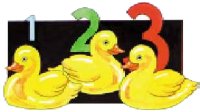Mathematics helps children make sense of the world around them and find meaning in the physical world. Through mathematics, children learn to understand their world in terms of numbers and shapes. They learn to reason, to connect ideas, and to think logically. Mathematics is more than the rules and operations we learned in school. It is about connections and seeing relationships in everything we do.

Children learn best when they are interested and even excited about what they are doing. As a parent, you have the special opportunity to make the most of the moments during the day when your children are curious. Toddlers may just point to objects saying "dat?" to ask what it is. Describe it for them, "Oh, that's a pink flower" or "the chair has a square seat." As your children get older, they may ask "how many?" or "what color ... ?" These questions encourage children to think. Teachers and schools must plan activities, but you don't have to plan in advance. Just take advantage of learning opportunities that happen naturally. You can turn these times into teachable moments. When you use daily events that have meaning to your children, the impact is very powerful.
Give your children many opportunities to see and hear different things, and to move about and play with things they can touch. Let them collect things, and show you and tell you things in their own way. You don't have to "teach" your children facts or math rules or even organize their mathematical learning. Rather, encourage them to ask questions-- questions that require more than a simple yes or no, like "what would happen if ... ?" Encourage children to think. Also, ask them questions and allow them to explore different ways of solving problems. If they seem to be going way off the mark, lead them back by starting with the part of their approach that was logical. Always show respect for their thinking and accept their point of view. Remember, children think much differently than adults. Take your time. Children, including those with special needs, tire easily. It is better to go lightly and keep their interest than to push too hard.
All of the activities here can be done during your children's daily routines. They require no special equipment or detailed planning. Use them to do something pleasant with your child, add some interest to an otherwise routine activity, or just keep your children interested or occupied. But remember, it is not just the doing but the thinking that promotes learning. The questions you ask your children and the questions they ask you are very important. We have tried to suggest how you might ask your children interesting questions and build on their answers. Hopefully, these activities will make your day easier and more productive.
How to Use These Activities
The activities here are designed to promote the learning and development of the "whole child." In other words, we are not just focusing on developing mathematics in young children. Instead, we are giving you sets of activities that provide young children with experiences that will help to get them ready for kindergarten. These activities build language skills, increase thinking and problem-solving abilities, develop social skills, promote large and small muscle development, and increase general knowledge.
We are focusing attention on children's early lives before they enter school. Children's development is nourished through everyday play and explorations of the world around them. Therefore, it is important that families support young children's learning and play, answer their questions, take care of their physical health needs, and stir their natural curiosity in order to lay foundations for success in school and beyond.
You may find that your 2- to 3-year-old child is ready only for some of these activities, while your 4- to 5-year-old can do many of them. Every child develops at his or her own pace.
Go at Your Child's Pace
All children love to have things repeated even when they already know them, so don't hesitate to do things over and over again. In fact, repetition is how children practice what they are learning - and practice improves learning. Some children may need extra guidance when doing some activities. The younger the child, the more important it is to keep the activities short, and focus on the activities that use objects your child can touch and play with.
All children do not develop at the same rate. Many children are able to accomplish certain things at specific ages. For example, at 2 years of age, many children can turn pages in a book, say two or three words together, and kick a ball. Other children may not do some of these things until they are closer to 3 years old.
Some children who have disabilities or chronic health conditions may need extra time to develop and learn. Just because they have a special need does not mean that they cannot take part in the activities in this booklet. In fact, it is particularly important that they are given opportunities to participate and learn. However, it may be necessary to make some of the activities shorter, to use adapted materials or language, and to repeat the activities more frequently. Just make sure the activities are appropriate and not frustrating.
Math Activities for Ages Two to Five: